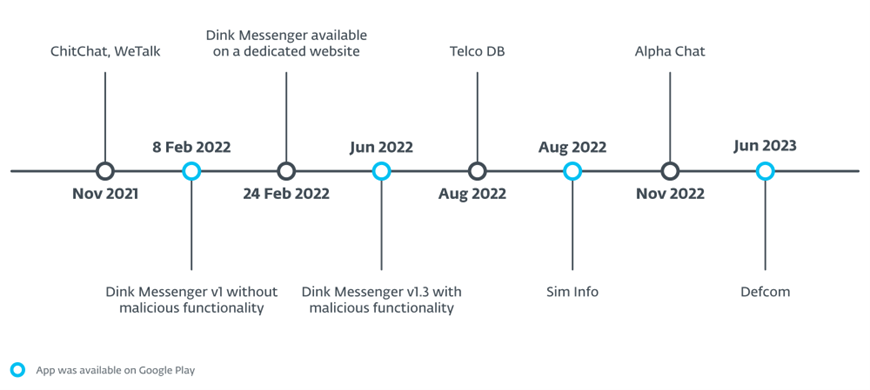- An active and targeted Android espionage campaign, eXotic Visit, started in late 2021 and mainly impersonates messaging apps that are distributed through dedicated websites and Google Play.
- The region of interest seems to be South Asia; in particular, victims in Pakistan and India have been targeted.
- Downloaded apps provide legitimate functionality, but also include code from the open-source Android XploitSPY RAT. ESET Research linked the samples through their use of the same C&C, unique and custom malicious code updates, and the same C&C admin panel.
- Throughout the years, these threat actors have customized their malicious code by adding obfuscation, emulator detection, hiding of C&C addresses, and use of a native library.
- Currently, ESET Research does not have enough evidence to attribute this activity to any known threat group; we track the group internally as Virtual Invaders.
BRATISLAVA — April 10, 2024 — ESET researchers have discovered an active espionage campaign targeting Android users with apps primarily posing as messaging services. While these apps offer functional services as bait, they are bundled with the open-source XploitSPY malware. ESET has named this campaign eXotic Visit and has tracked its activities from November 2021 through to the end of 2023. The targeted campaign has been distributing malicious Android apps through dedicated websites and, for a period of time, through the Google Play store as well. Because of the targeted nature of the campaign, the apps available on Google Play had a low number of installs; all of them have been removed from the store. In this likely targeted attack, the eXotic Visit campaign appears to primarily target a select group of Android users in Pakistan and India. There is no indication that this campaign is linked to any known group; however, ESET is tracking the threat actors behind it under the moniker Virtual Invaders.
Apps that contain XploitSPY can extract contact lists and files; extract the device’s GPS location; and extract the names of files listed in specific directories related to the camera, downloads, and various messaging apps such as Telegram and WhatsApp. If certain filenames are deemed to be of interest, they can subsequently be extracted from these directories via an additional command from the command and control (C&C) server. Interestingly, the implementation of the chat functionality integrated with XploitSPY is unique; we strongly believe that this chat function was developed by the Virtual Invaders group.
The malware also uses a native library, which is often used in Android app development for improving performance and accessing system features. However, in this case, the library is used to hide sensitive information, like the addresses of the C&C servers, making it harder for security tools to analyze the app.
The apps – Dink Messenger, Sim Info, and Defcom – were taken down from Google Play; moreover, as a Google App Defense Alliance partner, ESET identified ten additional apps that contain code that is based on XploitSPY and shared its findings with Google. Following the ESET alert, the apps were removed from the store. Each of the apps had a low number of installs, suggesting a targeted approach rather than a broad strategy. Overall, around 380 victims have downloaded the apps from websites and Google Play store and created accounts to use their messaging functionality. Because of the targeted nature of the campaign, the number of installs of each app from Google Play is relatively low – between zero and 45.
ESET has identified the malicious code used as a customized version of the open-source Android RAT, XploitSPY. It is bundled with legitimate app functionality, most of the time being a fake, but functioning, messaging application. The campaign has evolved over the years to include obfuscation, emulator detection, and hiding of C&C addresses.
XploitSPY is widely available, and customized versions have been used by multiple threat actors such as the Transparent Tribe APT group, as documented by Meta. However, the modifications found in the apps are distinctive and differ from those in previously documented variants of the XploitSPY malware.
For more technical information about the eXotic Visit campaign, check out the blog post “eXotic Visit campaign: Tracing the footprints of Virtual Invaders”. Make sure to follow ESET Research on Twitter (now known as X) for the latest news from ESET Research.
Timeline of the first appearance of XploitSPY-riddled apps that are part of the malicious campaign:
About ESET
ESET provides cutting-edge digital security to prevent attacks before they happen. By combining the power of AI and human expertise, ESET stays ahead of known and emerging cyber threats — securing businesses, critical infrastructure, and individuals. Whether it’s endpoint, cloud or mobile protection, its AI-native, cloud-first solutions and services remain highly effective and easy to use. ESET technology includes robust detection and response, ultra-secure encryption, and multi-factor authentication. With 24/7 real-time defense and strong local support, we keep users safe and businesses running without interruption. An ever-evolving digital landscape demands a progressive approach to security: ESET is committed to world-class research and powerful threat intelligence, backed by R&D centers and a strong global partner network. For more information, visit www.eset.com or follow us on LinkedIn, Facebook, and X.
